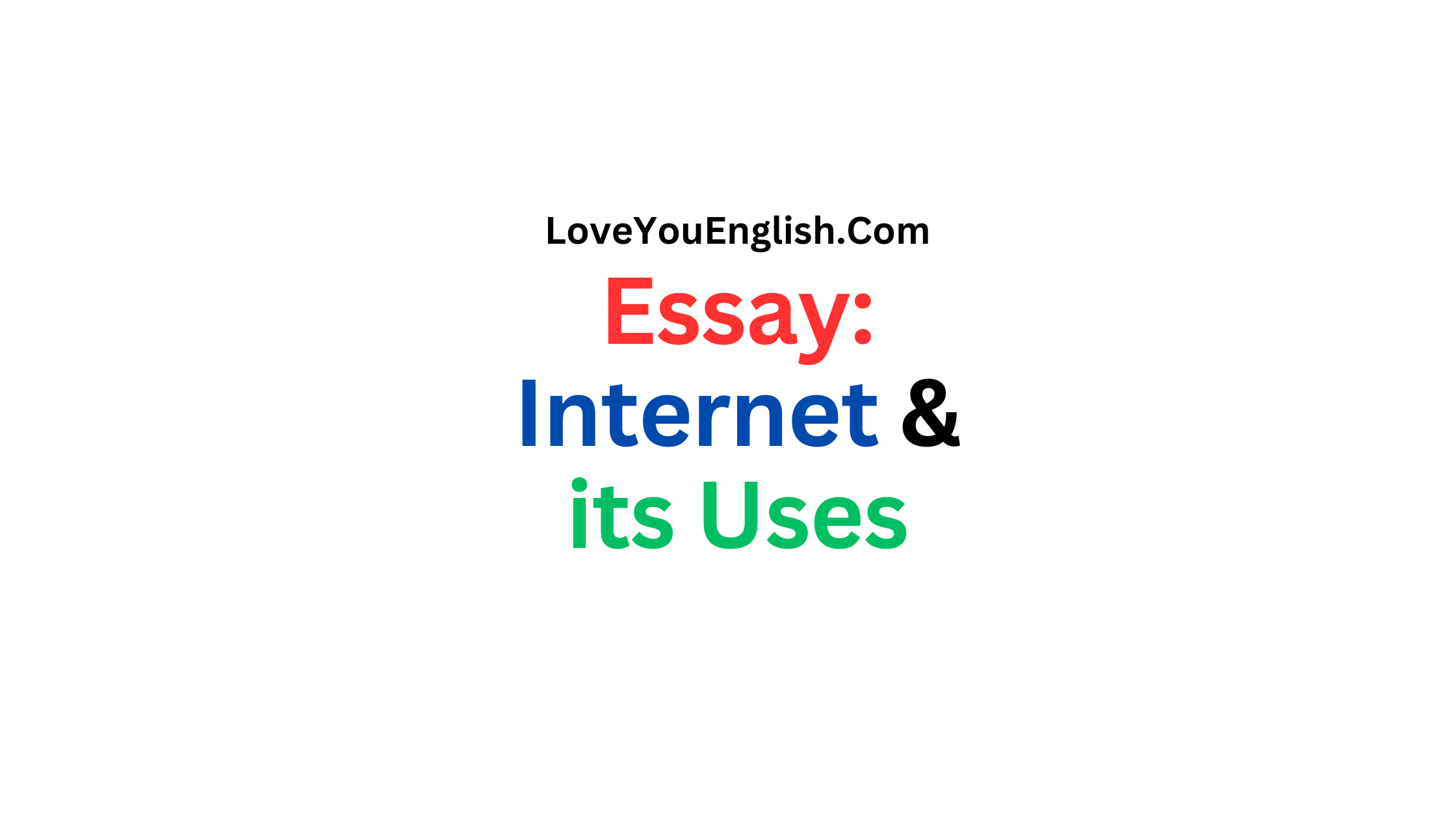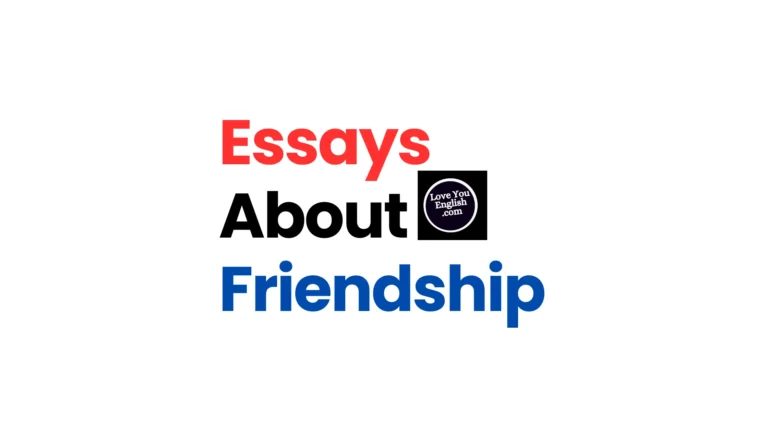Essay Writing: What is Internet & its Uses
Essay Writing: What is Internet & its Uses
The internet is super important in our lives today. It changed how we talk, work, study, and have fun.
It’s like a huge web of computers and gadgets that lets us do so much.
We can chat with people from all over and find tons of info and services in a snap.
Let’s check out all the cool things the internet lets us do and how it’s made a big difference in how we live and work.
Communication
The internet has really changed how we communicate with each other.
Now, we can talk to anyone around the globe instantly and without spending much money, which has changed the way we connect with our friends, family, and coworkers.
Email is still super important for online communication. It lets us send messages and documents quickly and easily, and people use it for both personal chats and work-related messages.
Instant messaging apps like WhatsApp, Facebook Messenger, and Telegram let us have real-time conversations through text, voice calls, and even video chats.
Social media platforms such as Facebook, X, Instagram, and LinkedIn have opened up new ways to share updates, pictures, and ideas with our friends, family, and even the whole world.
Video conferencing tools like Zoom, Skype, and Google Meet allow us to have face-to-face conversations no matter how far apart we are, changing the way we interact personally and in business.
Voice over IP (VoIP) services like Skype and Vonage let us make cheap or even free voice calls over the internet, skipping the usual phone networks.
Information Access and Learning
The internet has made it easier for everyone to find information, allowing anyone with a connection to explore a huge variety of knowledge and learning materials.
Search Engines:
Websites like Google and Bing let you find information on almost any subject instantly.
Online Encyclopedias:
Platforms like Wikipedia and others provide detailed information on many different topics.
E-learning Platforms:
Sites such as Coursera, edX, and Khan Academy offer free or affordable courses from well-known schools, making learning more available than ever.
Digital Libraries:
A lot of libraries now let you access their collections online, including e-books, research papers, and historical records.
Educational YouTube Channels:
Many creators share excellent educational videos covering everything from science and history to art and philosophy.
More essays:
- Essay About Swami Vivekanand for Students
- Essays about Rabindranath Tagore for Students
- Essay about Travel in English for Students
- Nature Essay For Students In English
- Essay on Pollution in English for Students
Entertainment
The internet has completely changed the way we enjoy and engage with entertainment.
Streaming Services:
Websites like Netflix, Hulu, and Disney+ have transformed our TV and movie-watching habits by giving us instant access to huge collections of shows and films.
Music Streaming:
Platforms such as Spotify, Apple Music, and Pandora allow us to listen to millions of songs right away and create our own playlists.
Online Gaming:
Whether it’s simple mobile games or huge multiplayer online games (MMORPGs), the internet has made gaming a fun, social experience that connects people all over the world.
Podcasts:
This new type of audio entertainment and learning is available on many platforms and covers a wide range of subjects.
Virtual Reality and Augmented Reality:
These new technologies provide exciting entertainment experiences that are often made even better with internet access.
E-commerce and Online Shopping
The internet has completely changed the way we buy and sell things, leading to new ways of doing business and altering how people shop.
Online Marketplaces:
Websites such as Amazon, eBay, and Etsy let both individuals and companies sell their products to customers all over the world.
Digital Storefronts:
A lot of businesses now operate online stores, which helps them reach customers far beyond their physical shops.
Comparison Shopping:
There are many websites and apps that help you easily compare prices and check reviews before you decide to buy something.
Digital Payments:
Tools like PayPal, Apple Pay, and even cryptocurrencies have made it easier and safer to shop online.
Subscription Services:
Nowadays, you can get everything from software to meal kits through subscription services that the internet makes possible.
Work and Productivity
The internet has completely transformed the way we do our jobs, making it easier for people to work together and from different places.
Cloud Services:
Tools like Google Workspace and Microsoft 365 let people edit documents together and share files easily.
Team Management Tools:
Apps like Trello, Asana, and Basecamp help teams stay organized and manage their tasks effectively.
Working Remotely:
Thanks to the internet, many jobs can now be done from anywhere, which gives workers more flexibility and access to talent from around the world.
Freelance Websites:
Platforms like Upwork and Fiverr help freelancers find clients from all over the globe, opening up new job opportunities.
VPNs:
These allow people to securely connect to their company’s network while working from different locations.
Social Networking and Community Building
The internet has opened up new ways for people to meet and interact based on what they like, what they’ve been through, or what they want to achieve.
Interest Groups:
Websites like forums, subreddits, and Facebook groups let people come together over their favorite hobbies or interests.
Job Networking:
LinkedIn and other job-related sites help people grow their careers and make professional connections.
Help Groups:
Online communities offer support and information for those facing different life challenges or health problems.
Fundraising:
Sites like Kickstarter and GoFundMe help people and organizations gather money for their projects or causes.
Citizen Reporting:
Social media and blogs let everyday people share news and opinions, giving them a voice outside of regular news outlets.
Research and Scientific Collaboration
The internet has sped up scientific advancements by making it easier for researchers all over the globe to work together and share information.
Open Access Journals:
A lot of scientific articles can now be accessed for free online, which helps spread research results more widely.
Data Sharing:
Researchers can quickly share and analyze large sets of data with others from different institutions and countries.
Collaborative Tools:
Websites like GitHub help people share code and work together on software projects.
Citizen Science:
Online projects let everyday people help with scientific research by collecting or analyzing data.
Virtual Conferences:
Online platforms allow researchers to showcase and discuss their findings without having to travel.
Healthcare and Telemedicine
The internet has made it easier for people to find healthcare information and services.
Online Health Resources:
Trustworthy websites offer details about symptoms, illnesses, and possible treatments.
Telehealth:
Online appointments let patients get medical advice and even treatment without needing to go to a doctor’s office.
Health Monitoring:
Gadgets and apps help people keep track of their health stats and share that information with doctors.
Digital Health Records:
Enhance teamwork in healthcare by securely sharing patient information among different providers.
Mental Health Tools:
Offer resources, activities, and sometimes professional help for managing mental health.
Government and Civic Engagement
The internet has really transformed the way people connect with their government and get involved in community activities.
E-Government Services:
A lot of government services, like filing taxes and renewing licenses, can now be done online.
Open Data Initiatives:
More and more governments are sharing public data on the internet, which helps keep things transparent and allows for better analysis.
Online Voting:
Some areas are looking into or starting to use safe online voting systems.
Digital Activism:
Social media and online petitions have become strong tools for people to organize and push for social and political changes.
Crowdsourced Urban Planning:
Certain cities are using online platforms to collect feedback from citizens about city development projects.
Internet of Things (IoT)
The increasing number of devices that connect to the internet is opening up exciting new ways to automate tasks and gather information.
Smart Home Gadgets:
Devices like internet-connected thermostats, lights, and security systems let you control and automate your home from anywhere.
Industrial Internet of Things:
Sensors and devices linked to the internet in factories and farms boost productivity and help predict when maintenance is needed.
Wearable Devices:
Gadgets like fitness trackers and smartwatches gather and send data about how active you are and your health.
Smart Cities:
Infrastructure connected to the internet can improve traffic management, energy consumption, and public services.
Self-Driving Cars:
Having internet access is essential for creating and running self-driving cars and other autonomous vehicles.
Financial Services and Fintech
The internet has changed the way we handle our money and use financial services.
Online Banking:
Nowadays, many banks provide full online and mobile banking options.
Investment Platforms:
Online brokers and robo-advisors have made it easier for people to invest.
Cryptocurrency:
Digital currencies like Bitcoin use blockchain technology that works over the internet.
Peer-to-peer Lending:
Websites now link lenders directly with borrowers, skipping the usual banks.
Mobile Payments:
In many places, people often use their smartphones to make payments.
Travel and Tourism
The internet has completely transformed the way we organize, reserve, and enjoy our trips.
Services such as Expedia and Booking.com make it super simple to compare and book flights, hotels, and car rentals.
Feedback Websites:
Platforms like TripAdvisor let travelers see reviews from others, helping them choose the best options.
Online Exploration:
With 360-degree videos and virtual reality, people can check out different places without leaving home.
Map Apps:
Thanks to GPS on smartphones and apps like Google Maps, finding your way in new areas is way easier.
Shared Services:
Companies like Airbnb and Uber have opened up new choices for where to stay and how to get around.
Art and Creativity
The internet has created exciting new ways for artists to express themselves and share their work.
Digital Art:
This is a type of art made with digital tools, and it’s often shared or sold on the internet.
Music Production and Distribution:
With digital audio software and streaming services, the way we make and listen to music has completely changed.
Online Portfolios:
Artists and designers can now easily display their creations to people all over the world.
Collaborative Art Projects:
The internet allows artists to work together on projects no matter where they are located.
Virtual Museums and Galleries:
These platforms let people explore art collections from different parts of the globe.
Environmental Monitoring and Conservation
The internet is super important for keeping an eye on and tackling environmental problems.
Remote Sensing:
Data from satellites shared online helps us watch things like deforestation, melting ice, and other changes in the environment.
Wildlife Tracking:
Tags and cameras that connect to the internet allow scientists to keep track of animal populations and their movements.
Citizen Science:
Websites let regular people help gather and analyze environmental data.
Environmental Advocacy:
Social media and online campaigns help spread the word and encourage action on environmental issues.
Smart Grid Technology:
Power grids that connect to the internet can make energy use more efficient and help use renewable energy sources better.
Challenges and Considerations
The internet has many advantages, but it also comes with some problems that we need to tackle as a society:
Digital Divide:
Making sure everyone has fair access to the internet and its advantages is a big challenge.
Privacy and Security:
With so much personal information online, there are worries about keeping our privacy safe and protecting against cyber threats.
Misinformation:
The quick spread of false information on the internet can lead to serious issues in society.
Digital Addiction:
Spending too much time on internet-connected devices can harm our mental health and affect our relationships with others.
Environmental Impact:
The energy used by data centers and electronic gadgets adds to climate change.
Conclusion
The internet plays a huge role in our daily lives now, changing how we do almost everything.
It allows us to communicate, learn new things, work, and enjoy ourselves.
As technology improves, the internet will be even more crucial in shaping what our future looks like.
However, we need to be aware of the challenges that come with it.
Ensuring everyone has access, protecting our personal information, fighting against misinformation, and minimizing its environmental effects are all very important issues.
If we tackle these challenges, we can enhance the internet and help build a world that is more connected, intelligent, and innovative.
The internet keeps evolving, and we can use it in countless ways.
It will continue to transform technology, society, and our way of life.
Whether it’s through advancements like artificial intelligence, more devices linked to the internet, or new technological applications, the internet will keep changing our world in ways we can’t even foresee.







